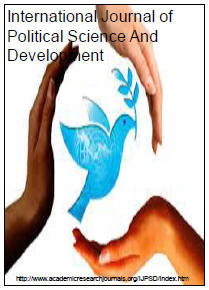| IJPSD |
International
Journal of Political Science and Development |
||||||||||||||||||||||
|
International Journal of Political Science and Development Vol. 3(3), pp. 138–151, March, 2015. DOI: 10.14662/IJPSD2015.021 ISSN: 2360-784X
Research Paper
Economic and Social Transformations of Korea; Lessons for Developing Countries With a particular Relevance to Ethiopia
Mohammed Yimer
Department of Civic and Ethical Studies, College of Social Sciences and Humanities, Arba Minch University, Arba Minch, Ethiopia. E-mail: muhamed_yimer@yahoo.com
Accepted 20 March 2015
The economic and social transformations of South Korea since 1960 are
one of the biggest success stories in the history of development. In
just a few decades, South Korea transformed itself from an agricultural
society to an industrialized nation exporting high-technology products
within the same time gap, it could dramatically and successfully
transformed itself from aid effectiveness to development effectiveness.
Though, just like many developing countries, authoritarian rule was a
norm in Korea, more than two decades of authoritarian rule South Korea
changed relatively peacefully to a democratic society in 1987.In the
face economic stagnation and enormous development problems: Poverty,
inequality, a low life expectancy, illiteracy, and poor service
delivery, Ethiopia is trying its best to transform itself to standard in
which its citizens in every stage will be beneficiary. It can get
valuable insights for its journey towards sustainable development.
Accordingly, Ethiopia needs to take lesson in the specific areas in
which Korea has been used. Among others, investment in infrastructure,
building human capability, technology transfer, Export orientation, tax
policy and administration, technology financing, industrial policy,
foreign direct investment and others are the directions in which
Ethiopia can take ultimate advantage. Cite This Article As: Yimer M (2015). Economic and Social Transformations of Korea; Lessons for Developing Countries With a particular Relevance to Ethiopia. Inter. J. Polit. Sci. Develop. 3(3): 138-151
|
|
|||||||||||||||||||||
